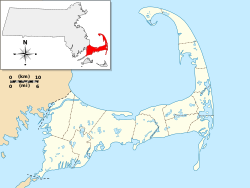
The Black Tavern is an historic tavern at 138-142 Dudley Center Road in Dudley, Massachusetts. The main block of the tavern was built c. 1803, and is one of the town's finest examples of Federal period architecture. It originally housed a major stop on the stagecoach route between Boston, Massachusetts and Hartford, Connecticut. It is now maintained by a local preservation organization, and was listed on the National Register of Historic Places in 1985. In 2010 the listing was expanded to include the adjacent barn and annex, which the society acquired in 2000.

The Joseph Willis House is a historic colonial house located at 28 Worcester Street in Taunton, Massachusetts. Built in 1688, it is the city's oldest surviving building, and one of the oldest in the state.

The Briggs Tavern is a historic building at 2 Anawan Street in Rehoboth, Massachusetts. Built about 1780 and now used as a private residence, it is the town's only surviving 18th-century commercial building. It was listed on the National Register of Historic Places in 1983.

The Walnut Street School is a historic school building at 55 Hopkins Street in Reading, Massachusetts. A two-room schoolhouse built in 1854, it is the town's oldest public building. Since 1962 it has been home to the Quannapowitt Players, a local theatrical company. The building was listed on the National Register of Historic Places in 1984.

The Greenville Presbyterian Church is located on NY 32 just north of its intersection with NY 81 in Greenville, New York, United States. Its three buildings on two acres were listed on the National Register of Historic Places (NRHP) in 1985.

The Warren Sweetser House is a historic house at 90 Franklin Street in Stoneham, Massachusetts. It is one of the finest Greek Revival houses in Stoneham, recognized as much for its elaborate interior detailing as it is for its exterior features. Originally located at 434 Main Street, it was moved to its present location in 2003 after being threatened with demolition. The house was found to be eligible for listing on the National Register of Historic Places in 1984, but was not listed due to owner objection. In 1990 it was listed as a contributing resource to the Central Square Historic District at its old location. It was listed on its own at its new location in 2005.
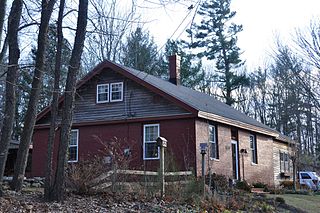
Dennison School House is a historic school building at Dennison Lane in Southbridge, Massachusetts. Built about 1849, it is the city's only surviving rural district schoolhouse built in brick. The building was listed on the National Register of Historic Places in 1989.

The Gen. George Cowles House, also known as the Solomon Cowles House, is a historic house at 130 Main Street in Farmington, Connecticut. Built in 1803, it is a prominent local example of Federal style architecture in brick, built for a prominent local family. The house was listed on the National Register of Historic Places on May 11, 1982.

The Theophilus Crawford House is a historic house at 53 Hickory Ridge Road South in Putney, Vermont. Built about 1808, it is one of the oldest brick houses in Putney, and one of its finest examples of Federal architecture in brick. It was listed on the National Register of Historic Places in 1995. Its current owners operate it as the Hickory Ridge House Bed and Breakfast Inn.
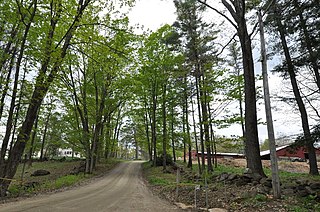
The John Adams Homestead/Wellscroft is a historic farmstead off West Sunset Hill Road in Harrisville, New Hampshire. The oldest portion of the farm's main house is a 1+1⁄2-story wood-frame structure built in the 1770s. It is one of the least-altered examples of early Cape style architecture in Harrisville, lacking typical alterations such as the additions of dormers and changes to the window sizes, locations, and shapes. The farmstead, including outbuildings and an area of roughly 2 acres (0.81 ha) distinct from the larger farm property, was listed on the National Register of Historic Places.

The Dorchester Common Historic District encompasses three public buildings that front the public common in the village of Dorchester, New Hampshire. The oldest of the three buildings is the schoolhouse, which dates to 1808 and is now a local museum. The Dorchester Community Church was built in 1828, and the town hall in 1844, on the site of the town's first (1828) town hall. The district was listed on the National Register of Historic Places in 1985; the church was also separately listed in 1980.
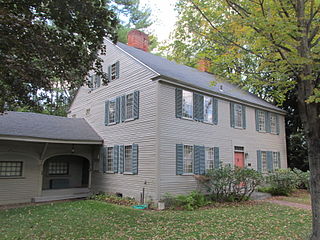
The Sawyer Tavern is a historic building at 63 Arch Street in Keene, New Hampshire. Probably built c. 1803–06, it was long a neighborhood landmark, serving as a tavern and then inn and restaurant for parts of the 19th and 20th centuries. The building is now in residential use. It was listed on the National Register of Historic Places in 1980, and the New Hampshire State Register of Historic Places in 2007.
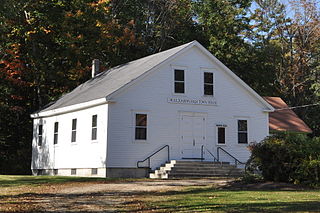
The Moultonborough Town House is the former town hall of Moultonborough, New Hampshire. It is located on New Hampshire Route 25 in Moultonborough's main village, and is now home to the local historical society. It was built in 1834, and is one of the oldest town hall buildings in Carroll County. It was listed on the National Register of Historic Places in 1989, and the New Hampshire State Register of Historic Places in 2004.
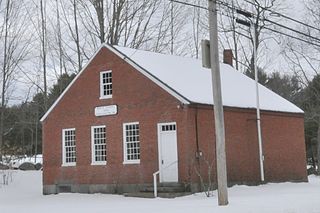
The North School, also known locally as the Brick School, is a historic one-room schoolhouse at 63 Amesbury Street in Kensington, New Hampshire, United States. Built in 1842, it was the only brick schoolhouse built in the town, and is one of its four surviving 19th-century schools. Of those, it is the best-preserved, and is used as a local history museum. It served the town's educational purposes between 1842 and 1956, and is now a local history museum. The building was listed on the National Register of Historic Places in 2013.

The Upper Dallas School is a historic former school building in, and the present town hall for, Dallas Plantation, Maine. Located on Dallas Mountain Road, it is the best-preserved of two surviving district schoolhouses built by the small community, and has apparently served as town hall since its construction. The building was listed on the National Register of Historic Places in 1990.
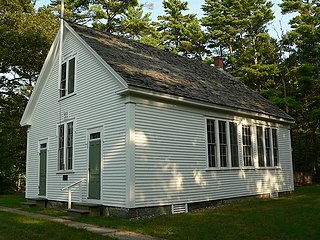
The Division No. 9 School is a historic former one-room schoolhouse on Maine State Route 9 in Wells, Maine. Built in 1900, it is the best-preserved of the town's surviving district school buildings, and is now a museum owned by the town. It was listed on the National Register of Historic Places in 1995.

The Jedediah Strong II House is a historic house at the junction of Quechee Main Street and Dewey's Mill Road in Hartford, Vermont. Built in 1815 by a local mill owner, it is a fine local example of a high-style Federal period brick house. It was listed on the National Register of Historic Places in 1974. It now houses professional offices.

The District Six Schoolhouse is a historic school building on Elmendorf Road in Shoreham, Vermont. Built about 1833 and now converted into a residence, this modest stone structure is one of Vermont's oldest surviving district schoolhouses. It was listed on the National Register of Historic Places in 1977.

The Sandy Pond School is a historic school building at 150 Sandy Pond Road in Ayer, Massachusetts. Built in 1868, it is the only surviving district school building in the town. Now a local museum, it was listed on the National Register of Historic Places in 2017.

The Brayton Homestead is a historic house at 159 Brayton Avenue in Somerset, Massachusetts. Built about 1796, it is one of Somerset's oldest surviving houses, and a rare local example of Georgian/Federal residential architecture. It was built by John Brayton on land purchased by his grandfather, and remained in the family into the 20th century. The house was listed on the National Register of Historic Places in 2020.

